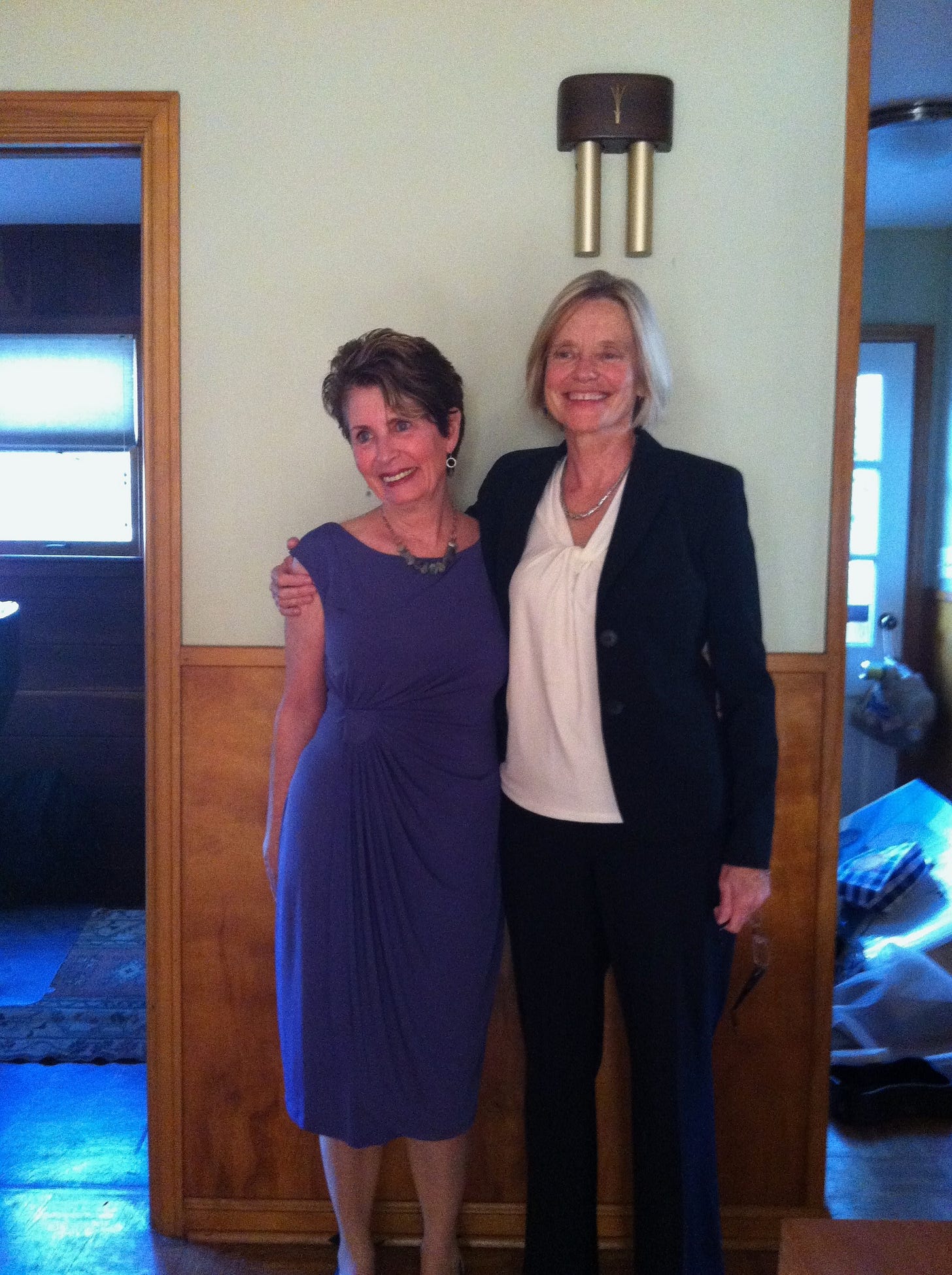The Inevitable Imperfections of a Long-Time Relationship
It took me years to realize: What made Nancy so bad at dying was what made her so good at living.

My partner seemed part mummy, part skeleton as I held her hand, which was puffy and mottled with blue. She hadn’t spoken all day, but I sensed her warm, steady grip communicated love. Nancy twisted under the sheets, pursed her mouth into a grimace, and fastened her eyes on mine.
“Am I dying?” she asked.
She could die within hours, a day, perhaps more. She hadn’t yet dispensed her final words or her blessings. Surely, she’d want this last chance to come to terms with her ending.
“Yes, you are darling.”
“Well, thanks for telling me that,” she snarled.
If there was a hint of her sardonic wit, I didn’t catch it. If I ran from the room or dropped her hand, I don’t remember. The last words of a dying loved one are indelible. My partner was dying. How much worse could it be? It could be worse if she died angry at me.
The scene of our meeting was more thrilling than our ending. We met 27 years ago in the 1980s, when gay marriage was illegal, and the lesbian baby boom hadn’t started. During our first date at a smoky Indian restaurant in Cambridge, Nancy asked me if I wanted to have children, a dream I’d relinquished when I came out as a lesbian.
Nancy had an endearing Boston brogue and a sporty, slouchy style. Her casual, in-the-moment affect was a welcome contrast to my moody, serious temperament. Within several dates, we knew we were perfect for each other, although later we’d laugh while singing Grace Jones’ song, “I’m Not Perfect (But I’m Perfect for You).”
We moved to Michigan for my faculty job and finally adopted our two daughters. We had conceived our children in our imaginations on that first date 10 years ago, but could not have comprehended how complete our world would be as a family of four.
I often arrived home late from work to find Nancy cuddled up with the girls on the sofa under her mother’s homemade afghan, cackling about one of their favorite sitcoms while devouring slices of Little Caesars pepperoni pizza. I squeezed in next to Nancy, before complaining about the greasy pizza and the boob tube. Nancy ruffled my hair and drew me closer. “Take a chill pill, darlin’, she said. And I did.
Like many otherwise happy couples, we had our share of conflict. I found it maddening that Nancy could never say “no” to our daughters, taking their side when they demanded new kitties and cell phones. Nancy tired of my fretting about everything, from our daughters’ schooling to contentious faculty meetings. The scraps chipped at the veneer of our relationship, but they didn’t alter its substance.
The girls were teens when Nancy cracked a rib while watering the Christmas cactus. She had terminal breast cancer, which had spread, her bones pockmarked with cancerous lesions. Yet the doctor assured us she’d have 10 to 15 years to live with adequate treatments. But each passing month revealed more evidence of the cancer’s incursions. A chasm opened in my stomach when I contemplated the possibility that Nancy could soon vanish from our lives..
Nancy’s cancer drew us together, but not always in healthy ways. She was angry that she had a terminal illness, and I was too thin-skinned to shrug off her outbursts. Nancy valued her independence and resented that I must drive her to every cancer treatment because of her fragile bones. She shrieked whenever I made a sharp left turn before cursing my lousy driving, while I cried that she was an unappreciative partner. At the end of nearly all of our tempestuous journeys to the hospital, she would say something like:
“I’m sorry. I can be a real asshole. You know I love you.”
Just like every other time she said that to me, I responded, “I love you, too.”
Was love the reigning sentiment that year? It would seem so if all you contemplated was our last-chance marriage. It was six months into Nancy’s last year in 2014, when a Michigan judge ruled that the state’s ban on same-sex marriage was unconstitutional. The very next day, a Saturday, some judges opened their courthouses to perform over 300 marriages.
Nancy was reading the paper in bed when I sauntered into the room and asked her if she wanted to get married. She laughed before she threw off her pajamas and put on clean jeans, accompanied by a silk scarf I had bought her when we were in Paris. We giggled as we drove to the courthouse, where we joined throngs of same-sex couples lined up to make their nuptials. My friend recorded us in the dark corridor at the back of the building where we said our vows. Nancy whispered, “in sickness and in health,” as she rolled her eyes to the ceiling, a vain effort to control her tears from falling. When she said, “till death do us part,” she gripped me so tightly I could feel the imprint of her fingers on my arm.
Five months later, and we were nearly full-time residents at the hospital. Nancy was nearly unrecognizable as her condition deteriorated. Our friends and relatives scooted out of the hospital room when she directed her barbs at them, but she reserved her most cutting comments for me. One morning, I nursed a latte as I waited for doctor’s rounds with my sister Sheila, who had come to help.
“Look at you with that cup of Starbucks in your hand,” Nancy spat. “Aren’t you precious?”
It had been our little ritual to grab lattes from the Starbucks kiosk before going to Nancy’s appointments. Nancy was hooked up to an IV now and deprived of the solace of good coffee. The nurse chided Nancy for being unkind to her caretaker, then led me into the family room.
Sheila rubbed my back while I wailed and shook. “What have I done to deserve this terrible treatment from her?”
“Nancy lashes out at you because she knows she can. You’re over-tired and stressed. Go home and take a bath. I’ll stay with Nancy.”
How long had Nancy been angry at me? Had she been envious of me for my good health and my rewarding career? Maybe she decided I had been a lousy partner. I regretted the times I chided her because of her looseness with money and the girls. Maybe nothing I could do could dispel the anger that had taken hold of her. After Nancy died, I questioned if her anger had supplanted her love for me. I queried my sister Meg, who had been with us the week Nancy died.
“Did you see how angry she was at me at the end?”
“I did,” she said. “Nancy was mad at cancer, not at you.”
What made Nancy so bad at dying was what made her so good at living. She delighted in small things, like the weeds that turned out to be mint in our backyard. She embarrassed our daughters every time she lay down on the front lawn, her arms spread wide like an angel, her chin lifted toward the sky. Some days she returned from chemo to sit on a chair in the middle of the snow-packed yard, wrapped up in her knitted cap and down coat, seeking to experience whatever dim glimmer of sun could be found in a Michigan sky. She doled out candy to the kids and set up firework displays at Fourth of July parties, while the rest of us tut-tutted.
My grief was long and “complicated,” as the medical researchers would say. I couldn’t let go of the lingering fear that Nancy had turned on me at the end. But with time I came to accept that ours was an imperfect love story.
Whenever I went into my study seeking to retrieve some document or other, I found myself sifting through the stacks of photos of cards that illustrated Nancy’s love for me.
I extricated a blurry picture of us slow dancing at a straight wedding, a public display of affection, I’m embarrassed to say, we didn’t make until we reached our fifties. I laugh at the photos the girls took of us as we headed out to a jazz concert, dressed in our most elegant attire. We stand in the hallway, belting out “cheese” to our photographers, oblivious to the bag of garbage that is just behind us. I occasionally replay the video of Nancy and me at our wedding, surprised every time I see her struggle to contain her emotions. Why did I let the memories of her anger eclipse the memories of her love?
I scoured my bookshelves some months ago when I discovered a lesbian parenting anthology that Nancy had given me for my birthday as we prepared to adopt our daughter. I hoped the inscription would finally dispel my doubt: “To JJ,” she wrote. “With love and excitement and expectation and anticipation and joy, and…need I say more?”
Julia Grant is a retired social historian from Michigan State who’s published books and articles in academic journals. As a professor, Julia helped to design the University’s LGBTQ Studies minor and developed a pioneering program for queer students in Amsterdam. She is currently working on a memoir, Miracles Don’t Last, which is part social history, part personal narrative, about the story of her love affair with her partner and her difficult departure.








This essay captures the complex interplay of pain and beauty that illness brings. It shows the profound impact on loved ones and reflects on the resilience of TRUE love that powers through even in the toughest, most uncertain of times...so powerful. You go, Julia!
Oh Julia - As a pastor I wish I could hold your pain. As a newly divorced LGBTQ I feel your loss. As a fellow teacher of sorts I celebrate your post. As a former caregiver I took am angry at how cancer kills and lastly we are here if you need us